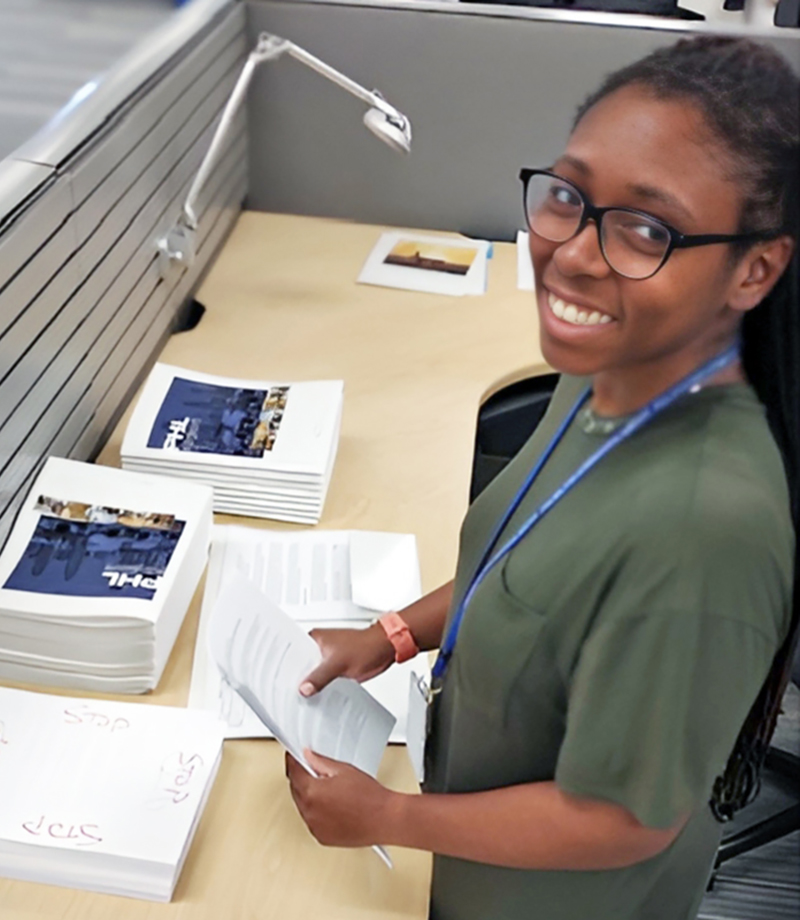Social Security makes every effort to ensure that any information published is accurate and up to date, but some information on this webpage may be historical.
Ticket to Work and Project SEARCH Enable Successful Launch for Grad with Autism Spectrum Disorder
Published in 2024
 Adrienne, a young woman with autism spectrum disorder (ASD), was ready to graduate from high school. Adrienne’s parents were uncertain about how to help their daughter lead a full life after high school. They knew that while in the K-12 school system, students with developmental disabilities have access to therapeutic interventions, special education and other individualized supports. However, after age 21, these supportive programs vanish and it’s easy for them to lose ground.
Adrienne, a young woman with autism spectrum disorder (ASD), was ready to graduate from high school. Adrienne’s parents were uncertain about how to help their daughter lead a full life after high school. They knew that while in the K-12 school system, students with developmental disabilities have access to therapeutic interventions, special education and other individualized supports. However, after age 21, these supportive programs vanish and it’s easy for them to lose ground.
The family needed guidance and decided to begin with the school guidance counselor. Adrienne’s guidance counselor told her about two programs that could provide the individualized support she needed for workforce readiness and success. She also connected Adrienne with Pennsylvania’s State Vocational Rehabilitation (VR) agency, where she would learn more about these programs and receive a vocational assessment and career counseling.
Ticket to Work & Work Incentives
The first program, Social Security’s Ticket to Work Program, supports career development for people with disabilities who want to work. Adults ages 18 through 64 who receive Social Security Disability Insurance (SSDI) and Supplemental Security Income (SSI) qualify. The program is voluntary and set up to help people replace their disability benefits with earnings from employment or self-employment.
Through the Ticket Program, Adrienne’s VR counselor told the family about the many employment services available through the Ticket Program. Adrienne wanted to find a job, but her parents had concerns about putting her SSI and Medicaid benefits at risk. Many individuals with disabilities who want to work face barriers to achieving their employment and earning potential because they have to choose between healthcare and work. To be part of the workforce, Adrienne needed Medicaid-funded support services and she needed help figuring out how to keep them once she began earning an income.
What is Autism Spectrum Disorder?
Autism Spectrum Disorder (ASD) is a pervasive developmental disability that interferes with some or all aspects of a person’s life. Deficits associated with ASD vary widely from person to person and can range from mild to severe. They may include but are not limited to difficulties with cognitive functioning, expressive and receptive communication, and reduced ability to understand social cues and form relationships with others. Often, ASD limits a person's capacity to live independently.
Her VR counselor recommended that Adrienne consult a Benefits Counselor, a trained professional who is qualified to help people understand the effect that earnings from work will have on their benefits. The family was referred to Community Integrated Services (CIS), an EN that would provide benefits counseling and remain by Adrienne’s side to help her navigate the path to employment.
Andrew, Adrienne’s counselor at CIS, began by explaining that Social Security rules called Work Incentives make it easier for adults with disabilities to gain work experience while receiving Medicaid or Medicare and benefits from Social Security. Adrienne and her family were relieved to learn that after becoming employed, her Medicaid coverage could continue, even if her earnings from work became too substantial for her to receive a monthly SSI payment. This Work Incentive, known as Medicaid While Working (1619b) would allow Adrienne to focus on pursuing employment without having to be concerned about losing her healthcare coverage. She would have time to gain work experience and determine if full-time employment was right for her.
Many different Social Security Work Incentives are available to help people go to work. Because these rules are complex and each person’s circumstances are different, individuals who qualify are encouraged to consult a Benefits Counselor who can help them make informed decisions about employment.
Once the family had a better understanding of relevant Work Incentives, their parameters and Adrienne’s responsibilities as a Ticket Program participant, Andrew and Adrienne created an Individual Work Plan (IWP). An IWP is like a road map that articulates employment goals and the steps to achieve them. Together, they worked on her resume, explored employment options and practiced interview skills.
Project SEARCH

While assisting Adrienne with job development, Andrew also communicated with staff at her high school about a school-to-work transition program called Project SEARCH. Project SEARCH offers technical training and experiential learning at host business internships. Adrienne received technical training, gained work experience, and learned soft skills every day at an internship site. Her Ticket Program service provider supported her efforts with on-site job coaching and guidance throughout this training.
Resources from the Ticket Program and Project SEARCH enabled Adrienne’s seamless transition to the workforce, while promoting collaboration among school administrators, service providers and employers. This formula, essential for success, has a track record of positive outcomes that are enriching the lives of young job seekers with disabilities across the country.
“We are grateful for Andrew and also Cynthia, one of Adrienne’s elementary school teachers, who played a special part to include Adrienne as part of the Project SEARCH initial flagship program.” says Adrienne’s father.
Adrienne immediately demonstrated her strong work ethic and knack for order as a Departmental Aide in the Human Resources Office at Philadelphia International Airport. Her administrative role included maintaining the copy room, managing office supplies, organizing files and helping co-workers wherever needed. Other departments at the airport recognized her skills and asked Adrienne to assist in their offices as well.
Launch
After completing Project SEARCH, Adrienne accepted a full-time position working for the city of Philadelphia as a Departmental Aide. She enjoyed the benefits of being a city employee, and by the end of 2017, proudly traded her SSI for a paycheck.
“I love everything about my job,” she says. “I like helping to organize things. I like my co-workers and they like me. I like getting out of the house and getting fresh air. Helping people makes me feel good!”

“Adrienne values earning her own paycheck,” her mother says.
“Office supervisors appreciate her aptitude for technology, her attention to detail, her organizational skills, and the conscientious approach she brings to the office every day,” Andrew adds.
According to her father, “Adrienne is outgoing without being intrusive and everyone at work adores her. It’s a wonderfully cohesive group... The environment is safe and supportive. We are grateful to the professionals at Ticket to Work, Project SEARCH, Andrew and Gary at CIS… and especially co-workers who cooperated to set her up for success!”
To achieve good outcomes, students with developmental disabilities need integrated services that begin before transition and continue after they find a job.
These employment programs can ignite the “adulting” engine in young people with special needs who require extra support to cultivate independent living skills. Adrienne’s family noticed that her experience with the Ticket Program, Project SEARCH and her employer started a maturation trajectory, helping her build the confidence and empowerment that fueled her personal growth. It is what every family hopes for.
“The support Adrienne received through Ticket to Work has been instrumental in promoting her development… in helping her become a more productive and independent young lady,” her mother says. “Work has given her a sense of purpose and self-esteem. It’s amazing how fast she has matured! She is learning her disability does not need to stop her from achieving the things she knows she’s capable of. Adrienne is happy and proud to be a working adult and we are so proud of her!”
With the right support, Adrienne found her path to a better future. Find yours! Call the Ticket to Work Help Line at 1-866-968-7842 or 1-866-833-2967 (TTY) or visit choosework.ssa.gov to learn more.